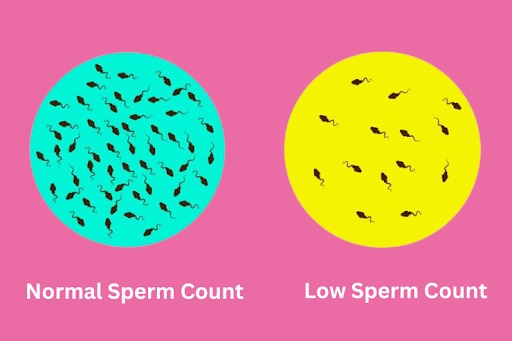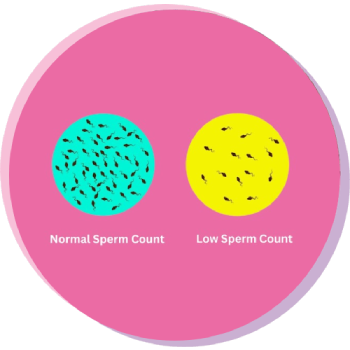What is Oligospermia (Low Sperm Count) ?
Oligospermia also known as Low Sperm Count, is a condition characterized by a decreased concentration of sperm in the ejaculate. Sperm count is considered low when there are fewer than 15 million sperm per milliliter of semen. This condition can significantly reduce the chances of conception and can affect male fertility.

Types
Oligospermia can be classified into several types based on the severity of the condition and the underlying causes:
- Mild Oligospermia: In this type, the sperm count is slightly lower than normal but still within a range that may allow conception
- Moderate Oligospermia: The sperm count is further reduced in this type, making conception less likely without medical assistance.
- Severe Oligospermia: This type is characterized by a significantly low sperm count, greatly reducing the chances of natural conception without assisted reproductive techniques.
- Pre-testicular Oligospermia: Caused by factors that affect sperm production before it reaches the testicles, such as hormonal imbalances or diseases affecting the hypothalamus or pituitary gland.
- Testicular Oligospermia: Arising from issues within the testicles themselves, such as genetic factors, infections, or exposure to toxins.
- Post-testicular Oligospermia: Resulting from blockages or obstructions in the ducts that carry sperm from the testicles to the penis, such as due to prior infections, surgeries, or congenital abnormalities.
These classifications help in determining the appropriate treatment approach and prognosis for individuals with low sperm count.
Symptoms
Generally Oligospermia does not have any symptoms but if it is associated with hormonal issues then it may be associated with loss of libido and decrease sexual desire.
When To See A Doctor?
If you notice symptoms suggestive of oligospermia, such as difficulty conceiving or changes in sexual function, it’s advisable to schedule a consultation with an IVF specialist or an and/rologist. While oligospermia itself may not always present noticeable symptoms, experiencing challenges with fertility can indicate an underlying issue that warrants medical attention.
Causes
Several factors can contribute to the development of oligospermia, including
- Hormonal imbalances
- Genetic abnormalities
- Testicular injury or infection,
- Varicocele (enlarged veins within the scrotum),
- Exposure to environmental toxins
- Medications.


Oligospermia Effects
- Infertility
- Emotional impact
- Relationship strain
- Physical interventions
- Genetic concerns
- Self-esteem
- Health issues
Oligospermia Diagnosis
Diagnosing oligospermia involves several steps:
- Medical history: The doctor will review your medical history, including any past illnesses, surgeries, medications, and lifestyle factors that may affect fertility.
- Physical examination: A physical examination, including an evaluation of the genitals and secondary sexual characteristics, may be conducted to check for any abnormalities.
- Semen analysis: The primary diagnostic test for oligospermia is a semen analysis. This involves providing a semen sample for evaluation of sperm count, motility (movement), morphology (shape), and other parameters.
- Repeat testing: If the initial semen analysis indicates low sperm count, additional tests may be performed to confirm the diagnosis. This may include repeat semen analyses to rule out temporary factors affecting sperm production.
- Hormonal testing: Blood tests may be conducted to measure hormone levels, such as testosterone, follicle-stimulating hormone (FSH), and luteinizing hormone (LH), to assess hormonal imbalances that may contribute to low sperm count.
- Imaging studies: In some cases, imaging studies such as scrotal ultrasound may be recommended to evaluate the testicles and detect any abnormalities if clinically obvious abnormalities are seen
- Additional evaluations: Depending on the individual case, additional tests or evaluations may be recommended to identify underlying health conditions or factors contributing to low sperm count.
At Shukan Hospital & IVF Centre in Ahmedabad, our experienced fertility specialists utilize state-of-the-art diagnostic techniques and personalized evaluations to accurately diagnose oligospermia and develop customized treatment plans tailored to each patient’s unique needs.
Oligospermia Treatments
Treatment options for oligospermia vary depending on the underlying cause and severity of the condition. Here are some common treatments:
- Lifestyle changes: Making lifestyle modifications such as maintaining a healthy weight, quitting smoking, limiting alcohol intake, avoiding recreational drugs, managing stress, and adopting a balanced diet rich in antioxidants and nutrients can help improve sperm production and quality.
- Medical treatments: Hormonal therapies, such as clomiphene citrate or gonadotropin injections, may be prescribed to address hormonal imbalances and stimulate sperm production in men with certain hormone deficiencies.
- Surgery: Surgical interventions may be recommended to correct anatomical abnormalities that affect sperm production, such as varicocele repair (varicocelectomy) to treat enlarged veins in the scrotum or surgical correction of other structural issues in the reproductive tract.
- Sperm retrieval: In some cases of severe oligospermia or azoospermia (absence of sperm in ejaculate), sperm retrieval techniques such as testicular sperm extraction (TESE) or percutaneous epididymal sperm aspiration (PESA) may be performed to collect sperm directly from the testicles or epididymis for use in ART procedures.
- Assisted Reproductive Technologies (ART): In cases where natural conception is not possible, techniques such as intrauterine insemination (IUI) or in vitro fertilization (IVF) with intracytoplasmic sperm injection (ICSI) may be used to achieve pregnancy. These methods involve collecting sperm from the male partner, preparing it in the laboratory, and then using it to fertilize the female partner’s egg.
- Nutritional supplements: Certain supplements, such as vitamin C, vitamin E, zinc, coenzyme Q10, and L-carnitine, may be recommended to improve sperm health and function.
- Alternative therapies: Some alternative therapies, such as acupuncture, may be used as complementary treatments to support fertility, although their effectiveness is not definitively proven.
Why choose Shukan Hospital & IVF Centre in Ahmedabad for Oligospermia treatment?
- Expert team: Specialized team of fertility specialists and andrologists.
- Advanced facilities: State-of-the-art diagnostic and treatment technologies.
- Personalized care: Tailored treatment plans for individual needs.
- Success rates: Proven track record of successful outcomes.
- Convenient location: Easily accessible in Ahmedabad.
- Continued support: Compassionate guidance throughout the journey.
Choose Shukan Hospital & IVF Centre for effective, compassionate care for low sperm count treatment in Ahmedabad.
Prevention
While some causes of low sperm count may not be preventable, there are several steps individuals can take to promote sperm health and potentially reduce the risk of developing oligospermia:
- Maintain a healthy lifestyle.
- Avoid tobacco, alcohol, and drugs.
- Protect against Sexually Transmitted Infections (STIs).
- Limit exposure to environmental toxins.
- Avoid overheating the testicles.
- Manage chronic health conditions.
- Practice good hygiene.
- Limit exposure to radiation and chemicals.
- Regularly check testicular health.
- Seek early intervention.
Oligospermia is significant for several reasons
- Fertility Issues: Low Sperm Count can significantly reduce the chances of natural conception, making it challenging for individuals or couples to conceive without medical assistance.
- Impact on Reproductive Health: It can be an indication of underlying health issues, such as hormonal imbalances, genetic factors, infections, or lifestyle factors like smoking, excessive alcohol consumption, or exposure to toxins.
- Emotional and Psychological Impact: Difficulty conceiving can lead to emotional stress, anxiety, and depression for individuals and couples struggling with oligospermia, affecting their overall well-being and relationships.
- Treatment Considerations: Understanding the severity and underlying causes of oligospermia is crucial for determining the appropriate treatment options, which may include lifestyle changes, medication, hormone therapy, or assisted reproductive techniques such as in vitro fertilization (IVF) or intrauterine insemination (IUI).
- Prognosis: Oligospermia can vary in severity, and the prognosis depends on factors such as the extent of the sperm count reduction, the underlying causes, and the effectiveness of treatment interventions.
Overall, low sperm count underscores the importance of monitoring reproductive health, addressing underlying health issues, and seeking appropriate medical care for individuals and couples facing fertility challenges.
FAQs
What is the difference between oligospermia and azoospermia?
Oligospermia refers to a low sperm count, where the sperm count in the ejaculate is below the normal range. Azoospermia, on the other hand, is the absence of sperm in the ejaculate due to either a blockage preventing sperm from being released or a problem with sperm production.
How should I take care of myself to make sure my sperm count is the best it can be?
To optimize sperm count and quality, maintain a healthy lifestyle by eating a balanced diet rich in fruits, vegetables, whole grains, and lean proteins. Avoid smoking, excessive alcohol consumption, and illicit drugs, and manage stress through regular exercise and relaxation techniques.
Can stem cell therapy be applied to every patient with oligospermia?
Stem cell therapy is still in the experimental stage for treating oligospermia and may not be suitable for every patient. Its effectiveness depends on various factors, including the underlying cause of oligospermia and individual health status.
How many times can stem cell therapy be administered in oligospermia?
The frequency and number of stem cell therapy sessions for oligospermia depend on individual response to treatment, severity of the condition, and recommendations from healthcare providers. Further research is needed to establish optimal treatment protocols.
Does stem cell therapy applied for oligospermia cause sexual reluctance?
Stem cell therapy for oligospermia is not known to cause sexual reluctance. However, any concerns or side effects should be discussed with a healthcare provider.
Can I get pregnant if my husband has oligospermia?
Despite low sperm count, pregnancy may still be possible through assisted reproductive techniques such as intrauterine insemination (IUI) or in vitro fertilization (IVF). Consultation with a fertility specialist can help explore suitable options.
What if the sperm count is 10?
A sperm count of 10 million per milliliter is considered low and may indicate oligospermia. However, successful conception is still possible with appropriate medical intervention, including assisted reproductive techniques.
Is IVF possible with oligospermia (low sperm count)?
Yes, in vitro fertilization (IVF) is a common treatment option for couples experiencing infertility due to oligospermia. During IVF, sperm is directly injected into the egg to facilitate fertilization, bypassing the need for sperm to travel through the reproductive tract.
Which food improves sperm?
Foods rich in antioxidants, vitamins (such as vitamin C, vitamin E, and vitamin D), minerals (such as zinc and selenium), and omega-3 fatty acids can support sperm health and production. Examples include fruits, vegetables, nuts, seeds, whole grains, fish, and lean meats.
What is the fastest way to cure low sperm count?
There is no quick fix for low sperm count. Treatment typically involves addressing underlying causes, adopting a healthy lifestyle, and potentially exploring medical interventions recommended by a healthcare provider.
How can I recover sperm in 24 hours?
Sperm production takes approximately 74 days, so it’s not possible to recover sperm within 24 hours. However, adopting a healthy lifestyle and avoiding factors that can negatively impact sperm production can support ongoing sperm health and production.
How long does oligospermia last?
The duration of oligospermia varies depending on the underlying cause, effectiveness of treatment, and individual factors. With appropriate medical intervention and lifestyle changes, some men may experience improvements in sperm count over time.
